Erstellt am: 23. 8. 2012 - 06:00 Uhr
Up Where The Reindeer Roam
It was 6.30 in the morning, but, this far north in August, it had already been light for a couple of hours. A fierce wind was blowing down the exposed, wide Lapland valley and the fabric of the outer tent was billowing like the sail of a ship. The sound was amplified in the confined space of the tent and it defied any attempts at sleep. It was cold and I didn't want to leave the warm burrow of my down-filled sleeping bag, but I needed to pee, so, muttering and pulling my ski beanie down to my eyebrows, I crawled out of the zipped opening of the tent and into the High Definition version of nature.
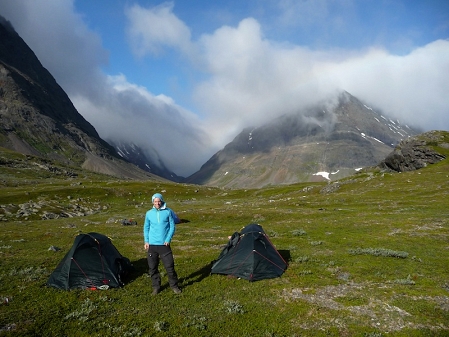
chris cummins
The sun never rises too high in Lapland so the sub-arctic light is always sharp as if you are living in a perpetual dawn and dusk. But at this fresh hour, with the icy wind blowing, the effect had been magnified tenfold. Everything was dramatically illuminated. I could see every contour on the rocky pyramid-shaped Tolpagorni mountain. The snow was glistening in bowl cut just under the triangular peak of where it looks like some Norse god had helped himself scoop of ice cream. A single cloud was hovering on top of the peak like a hat.
Our wild campsite was a huddle of 6 tents and everywhere sleepy looking people were emerging out of them like marmots popping out of the snow in spring. We padded around on the springy grass of the valley that was rich in wild blueberries. It had looked a sombre dark green when we had set up camp under grey skies the night before, but now the early light has caught the yellow and light green tinges of the moss and the heather.
I stumbled down to the Torne River, which was running fast and shallow over rocks, and dipped a mug into the current and drank straight from the river. The water was so cold it stung my teeth but, on a mad impulse, I threw off my beanie and splashed water over my face. When the initial shock passed, I find myself smiling. Here I was, 200km north of the Artic Circle, taking part in the Fjällräven Classic, a 110km trek across the iconic Kungsleden path in Swedish Lapland, carrying my home and my food on my back. I hadn't felt this free in years.
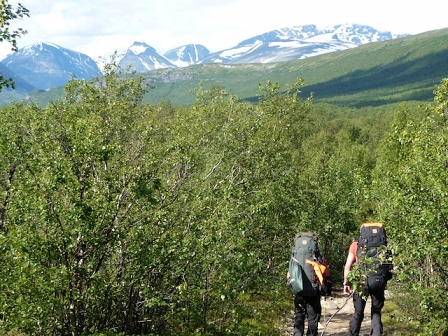
chris cummins
The night before I set off on the trek from the Sami settlement of Nikkaloukta I'd met Andreas Cederlund, the event manager of the Classic at the iconic Ice Bar at Jukkasjärvi and he gave me an introduction to the endurance event which was conceived 30 years ago as a way to encourage more people to get out into the wilderness. Some people see it as a competition, he told me, a race against themselves or other people, so some turn up at the start with running shoes and the minimum required safety equipment and jog the entire way. Yet others take as long as possible, spending as much time as they can beside the silvery free-running rivers and escaping from the hectic of everyday life. My friend Andi and I had five days free and no rush. We packed camera equipment, extra food and a hip flask and headed on to the start at Nikkaloukta.
In all 2,000 people take part every year in the Fjällräven Classic. Start places are snapped up within hours of being offered on-line. The start is staggered over three days with morning and afternoon departures, but even so, we set off in a long line marching hikers, weighed down by rucksacks and marked out with an orange safety sheet, like a scruffy army. But the crowds soon thinned out as we passed though sections of peat bog made passable by kilometre long stretches of wooden planking, then after we passed a check point at the foot of Kebnekaise, Sweden's highest mountain, we were into treeless fell country. The morning sun had been replaced by iron skies and everything seemed suddenly wild. The rounded peaks, which were not very high but which rose detached from one another straight out of the valley floor, looked like a row of grey-backed elephants.
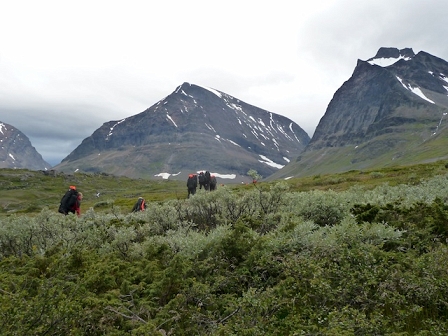
chris cummins
Day after day we trekked through this landscape. It wasn't particularly challenging at the pace we had chosen. We stopped often, at lunch unpacking our stoves and cooking up a warm meal. Towards evening, when we got weary, we'd set up a camp where there was a river nearby and a nice view.
At sunset the grey mountains turned brown and you could see their folds and crags like the wrinkles on an old fisherman's face. One night we climbed up a nearby peak to watch the sunset. Norway was just a valley away and there the mountains were higher and more jagged, with the ridged snow-capped peaks of Storsteinfjeillet bucking up like the dorsal fins of a pod of dolphins swimming nose to tail.
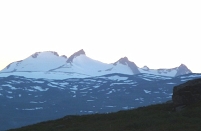
chris cummins
I'd had a tumultuous summer and up in Lapland, beyond the reach of mobile phone networks, I began to have a feeling of peace. I could have lived like that forever, I felt, walking, eating and sleeping. Or at least until the hip flask ran empty.
The valleys, formed by glaciers, were wide and the short-growing grass was already tinged with hints of rust and copper colours. This far north August is almost autumnal. Because of the colours, it reminded me of the landscape of my childhood on the moors of North Yorkshire, but everything was on a more epic scale. It made you feel small. It was the rivers I liked most. They separated into several channels and then merged again like an unruly tangle of silver spaghetti. Sometimes heavy boulders compressed the water of the rivers and it would run ragingly white, as if victim of a surprise mood swing. Willowy bushes grew into the marshy ground between the channels and sometimes there were wide patches of white flowers.
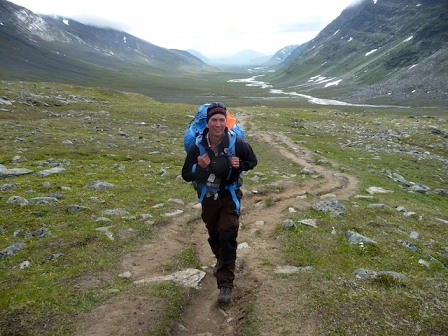
chris cummins
There were purple flowers along the path and some yellow-flowers, like dandy-lions, that our Swedish guide Mattias showed us how to eat. "There are not many vegetables up here," he explained, "So they are a valuable source of vitamin C. The Sami let the leaves soak into their milk overnight and in the morning there is a sort of nutritious yoghurt."
The traditional way of life of the indigenous Sami people of Lapland is being slowly eroded away, Mattias says, and young people tend to move to the cities. It's inevitable probably but Mattias thinks it is a shame for all of Sweden because "it's better if there are different values out there and ways of living our lives."
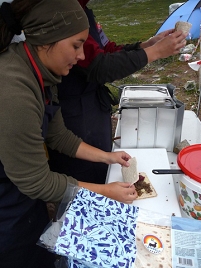
Chris Cummins
It's probably only fair to describe the Fjällräven Classic as wilderness for those, like me, who actually know nothing about the wilderness. There were checkpoints every 20 kilometres and twice on the trip we could fill up on packets of freeze-tried food. I didn't snare rabbits, I ate chicken tikka in large quantities.
Sometimes the checkpoints were in tiny hamlets of simple wooden Swedish huts, painted red or brown. At Singi, a reindeer herding centre where two valleys meet, a girl called Maya was handing out free reindeer kebabs, or souvas, made with rolled-flat bread filled with mashed potato and the dark gamey flesh of Lapland`s most iconic symbol. I'd promised myself, out of respect for the sensibilities of my 3 year old niece, that I would abstain from reindeer meat, but in the event and went around for a second helping of Rudolf kebab.
On the fourth day things got even easier. After the coldest summer anyone could remember, Lapland was experiencing somewhat of a heat wave, which here meant that temperatures had reached around 16 degrees. Our second guide Göran started going red in the face: "It's so hot!" he complained, finding a patch of shade. He'd spent weeks at a time camping in this area in winter during his military service, lugging heavy radio batteries around in the snow and darkness. He was built of pure muscle and it seemed he could endure everything but the heat, so when we came to a hut belonging to the Swedish mountain society, he took the opportunity to dive into to the chill Alesjaure Lake where the snow capped peaks were perfectly reflected into icy water. "Crazy young fool," I thought.
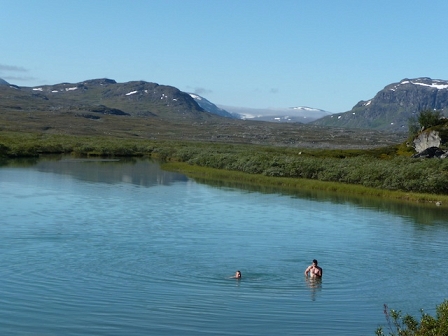
chris cummins
Yet, while begging for a coffee, I met a beautiful girl called Sandra who suggested that after three nights camping and hiking I was beginning to smell a bit pungent. Well, actually I invited the insult. I said "Do I smell?" and with a deadly serious face and wide unblinking she answered simply "Yes you do a bit." Indiana Jones, I imagine, suffered similar indignities.
Feeling ashamed I went to join Göran and took the coldest swim of my life. For a few seconds after diving in I was quite sure I would die, it was too cold to even scream, but when I got out, even with the mosquitos feasting on my white exposed skin, I felt I might well live for ever.
On the last day, we came down from the high fell country and back into the beech forest towards the resort village of Abisko – a ski resort in winter. The first part of the forest had been destroyed by a moth, a ten-year phenomenon which Mattias said was part of the life cycle of the forest. Yet it gave the last day a melancholy feel.
The scenery was still spectacular, with a crystal clear river running over smooth white rocks and then zigzagging through a white sheer walled canyon with the water looking green. But suddenly I wanted to finish – after five days without a mobile phone signal, I perversely switched on my phone, rushing towards the first flicker of reception. I was hurrying towards the very thing I had come to avoid – you can only escape yourself for so long.
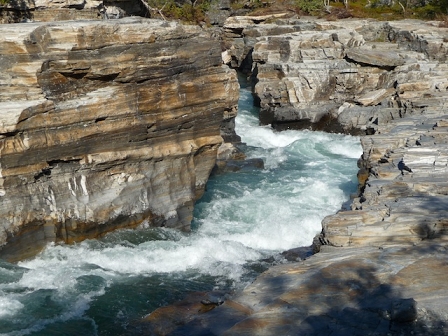
chris cummins
When we arrived in Abisko, a ski resort in winter that lies alongside a vast lake, we were greeted by applause from fellow trekkers who had already arrived. It seemed pretty undeserved given how we had dawdled along the way but I'll gratefully take praise at anytime and from anyone. We threw off our rucksacks and sat in a makeshift beer garden, raising toasts to each other and (forgive me Matilda) eating more reindeer kebabs. At night there was a band playing Kings of Leon covers in a tent and, although there can't have been more than 50 people in the audience, several tall Swedes were crowd surfing.
But at midnight, with the sky not really dark but dusk like, and the vast Torneträsk lake shimmering as if filled with mercury, I was sad. Mobile reception and W-Fi restored, and with them all the worries of the world, I longed for the blissful simplicity of a tent by a river and every morning a fresh departure.


